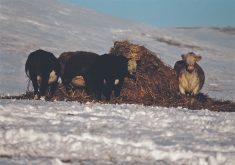Global food companies are improving their approach to animal welfare.
The Business Benchmark on Farm Animal Welfare assessed 150 companies in 23 countries and found in its seventh report that three quarters of those evaluated had shown improvement. The benchmark group is an independent body assessing farm animal welfare management and receives funding from Compassion in World Farming and World Animal Protection.
“There has been a fairly consistent improvement year on year over the duration of benchmark,” said Rory Sullivan, one of the report’s authors and the expert adviser for the business benchmark on farm animal welfare.
Read Also

Beef check-off collection system aligns across the country
A single and aligned check-off collection system based on where producers live makes the system equal said Chad Ross, Saskatchewan Cattle Association chair.
The report was released in a webinar and determined that the Co-op Group of Switzerland and the British companies Marks & Spencer, Noble Foods and Waitrose are global leaders in farm animal welfare.
Second tier status companies are Cargill, Co-operative Food in the United Kingdom and Unilever.
Canadian companies like Maple Leaf, Saputo and Loblaw’s are ranked at tier four, indicating the company is making progress on implementation of welfare policies. Sobeys is at tier five because it has the issue on the corporate agenda but has shown limited evidence of implementation.
The benchmark set 35 criteria covering management, commitment and policy. The survey reports an improvement in management, leadership governance and innovation as well as performance reporting.
Issues like how suppliers deal with confinement, transportation, antibiotic use, tail docking, beak trimming and castration are among the assessed activities.
The report said 64 percent of companies have explicit board or senior management oversight of farm animal welfare while 71 percent have published formal improvement for welfare. Some may advocate voluntary actions but may not demand suppliers follow certain practices.
“Close confinement is recognized as a key issue identified by companies. Very few companies are making universal commitments to the avoidance of close confinement,” Sullivan said.
Making a commitment to improved requirements is one thing but 82 percent of companies identify customer willingness to pay as a barrier to adopting higher standards. There are also few economic incentives for companies to support suppliers.
“The harsh reality is consumers are not particularly willing to pay more for higher standards,” Sullivan said.
Feedback from companies following this report ranged from dislike to those using it as a tool to make continuous improvement.
“Companies hate the benchmark when they are first introduced to it. Companies do not necessarily welcome another assessment or attempt to evaluate their performance,” he said.
Future pressure to change may come from investors but for now animal welfare is often low on the list, said Adam Kanzer of American BNP Paribas Asset Management. Based in New York, it has US$440 billion under management.
“A lot of investors have placed this question of how we treat animals in a very small bucket labeled ethical, not material, which is a big mistake,” he said.
However, more consumers are seeking greater understanding of food production. They are interested in food safety, health and nutrition as well as responsible and sustainable sourcing.
Food safety is a major consideration among some investment groups.
Since 2009, Paribas found among top 47 companies, food recalls had almost tripled. A third of the recalls were due to food borne pathogens, he said.
“We have seen as investors how an E. coli outbreak can destroy shareholder value overnight and even more lasting, it can destroy consumer confidence and a brand,” he said.
Some of the incidents might be related to the way animals were raised, such as those raised in close-confinement systems.
The world needs consistent food production standards, he said.
Some countries have strict regulations but companies need to strive for more.
“Regulations drive companies to the middle. It doesn’t drive them to be leaders. It sets minimum standards. Leadership still means something,” he said.
Companies at the top of the benchmark established higher animal care standards as part of an overall management approach.
“Within the food sector in particular this is an important indicator. These are difficult and often ignored issues. If you are managing them well it suggests that you have a solid management team in place,” he said.
Cargill was scored as a tier two company and has established specific policies, said Stephanie Cottee.
“It is important to our global food business,” said Cottee, global head of poultry welfare for Cargill.
“Animal welfare has also become a subject of increasing importance among our customers.”
The company wants science-based solutions that contribute to improved quality of life in improved handling, transportation and processing.
“We firmly believe animals raised for food need to be treated with dignity and respect. That is an expectation from all our businesses,” she said.
There are challenges and Cargill may not be able to control every aspect of its business. The company uses video auditing of its procedures and third party auditors at its processing facilities.
“We do work with a variety of supply chain models around the world. We have more influence with some than others due to the structure of the supply chain,” she said.
For example, the U.S. turkey business is vertically integrated, where birds are raised by farmers under contract. The company has oversight over the entire process. Conversely, beef is produced by many independent ranchers who sell to feedlots.

















